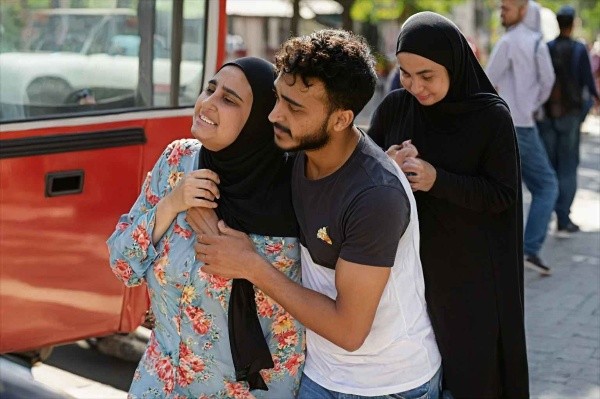Iran’s Plan to Strike Back Against the U.S.
Iran’s Military Preparations Following U.S. Attacks
Loading...

As Israel escalates attacks on Lebanon, civilians brace for more violent consequences amid conflict with Hezbollah.
Beirut, Lebanon – A Community in Crisis
In the face of intensive Israeli bombardment, Lebanese civilians find themselves in a dire situation. Umm Hassan, a resident of Nabatiya in southern Lebanon, recounts her experience as the conflict intensified. Despite her initial resolve to stay, she was compelled to evacuate with her family on Hezbollah's advice. This decision, she believed, was to protect civilians from the escalating violence between Israel and Hezbollah, whom she refers to as the "resistance" against what she calls the "Zionist state."
A Humanitarian Catastrophe Unfolds
The scale of the crisis is significant. Reports indicate that over 700 civilians have been killed in the Israeli attacks on southern Lebanon since the recent escalation began. This figure represents nearly half of all casualties in Lebanon since the conflict with Hezbollah resumed on October 8, following the onset of Israel's war on Gaza. The Lebanese civilians, particularly those from Hezbollah-controlled areas, fear they may face a fate similar to that of Gaza's inhabitants, where over 41,000 people have been killed, and mass displacement has occurred.
International Response and Political Tensions
Despite international efforts led by the United States and France to broker a 21-day ceasefire, Israeli Prime Minister Benjamin Netanyahu has rejected any truce. His government, facing accusations of war crimes and genocide in Gaza, remains steadfast in its military objectives. Netanyahu's recent statements at the United Nations General Assembly, where he accused the UN of anti-Semitism, underscore the strained relations. The Israeli leadership insists on continuing its offensive against Hezbollah until its objectives are met.
Provoking Hezbollah and Regional Implications
According to Michael Young, a Lebanon expert at the Carnegie Middle East Center, Israel's strategy appears aimed at provoking Hezbollah into a broader conflict. The Israeli military's focus on Shia-populated regions under Hezbollah's control is seen as an effort to elicit a significant retaliatory response. However, Hezbollah has thus far limited its attacks to military targets, avoiding civilian casualties that could justify more extensive Israeli reprisals. This cautious approach reflects an awareness of the potential consequences for Lebanon.
The Displacement Crisis and Social Strains
The ongoing violence has forced more than 90,000 Lebanese from their homes, many seeking refuge in northern towns and cities. This mass displacement has led to increased demand for housing, with reports of landlords in Beirut exploiting the situation by raising rental prices sharply. Hassan, a Beirut resident hosting displaced relatives, highlights the financial struggles faced by those fleeing the conflict, as rental prices have doubled.
Tensions are also evident among different Lebanese communities. In some areas, there is resistance to accommodating displaced individuals, fearing Hezbollah sympathizers might be among them. A notable incident in Tripoli, a predominantly Sunni city, involved residents confronting newcomers displaying Hezbollah imagery, reflecting longstanding animosities.
The Prospect of Wider Conflict
For those remaining in Hezbollah strongholds like the Bekaa Valley, the threat of further violence looms large. Ali, a young shopkeeper in Beirut, expresses concern for his family in Baalbek, a region already targeted by Israeli forces. Despite the dangers, many like Ali's parents prefer to stay on their land, valuing dignity over displacement.
The potential for an all-out war remains a pressing concern. The prospect of further escalation is real, especially if diplomatic efforts for a ceasefire falter. As the situation develops, the resilience and resolve of Lebanese civilians remain tested, facing both external aggression and internal challenges.
Editor
Iran’s Military Preparations Following U.S. Attacks
Troops remain in five strategic locations, raising fears of renewed tensions and long-term occupation.
Opposition forces have taken control of the capital after a significant offensive. Here is how it unravelled.
